Dangerous Trade Deals Threatening Democracy and Rights
UNISON have produced a useful document on international trade deals. The European Union is currently negotiating three major trade agreements that could have a profound impact on public services, regulation in the public interest and employment and labour rights. Many people will have heard about TTIP, the Transatlantic Trade and Investment Partnership between the EU and the USA but the EU is also negotiating an agreement with Canada, the Comprehensive Economic and Trade Agreement (CETA), and a wider agreement with 23 other countries, the Trade in Services Agreement (TiSA). Historically trade agreements sought to reduce tariff barriers to trade (taxes on imports). TTIP, CETA and TiSA are different: all three agreements are seeking to liberalise the trade in services, including public services; TTIP and CETA are also treaties seeking to protect the rights of foreign investors; finally TTIP aims to reduce ‘regulatory barriers’ to trade, forcing through a deregulatory agenda.
The EU lack of democracy has been question following recent events. Attention must not be deflected from the secret treaties being hatched between Europe and the US.
These treaties read like a corporate wish-list: secret courts that can sue our governments, the removal of environmental and health regulation and the degradation of working standards.
Who is set to benefit from this? Hasn’t Big Business had enough their own way?
Now Revealed: The scary truth about who is writing the terms of TTIP. With TTIP talks happening right now, it’s never been more important to spread the word about big business’ involvement in the deal. TTIP is a corporate lobbying paradise as the graphics show. More details on this link.
-
When preparing the mandate for the negotiations on TTIP, and in the first important months of the talks themselves (January 2012 to February 2014), the European Commission’s trade department (DG Trade) had 597 behind-closed-door meetings with lobbyists to discuss the negotiations.
-
For every meeting with a trade union or an environmental organisation, Malmström and her staff had 5 get together with companies and their lobby groups. (Check the full data and how we gathered it here). The lobby groups with the most such high level meetings on TTIP were the Transatlantic Business Council (representing over 70 EU and US-based multinationals), pharmaceutical lobby group EFPIA (lobbying for pharma giants like Eli Lily, Pfizer, Novartis, and GSK) and the Confederation of Swedish Enterprise.
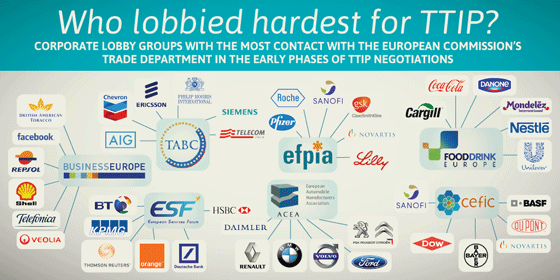 These are the corporate lobby groups which had by far the most lobby encounters with DG Trade in the preparatory and early phase of the TTIP negotiations (January 2012 to February 2014): BusinessEurope, the European employers’ federation and one of the most powerful lobby groups in the EU.
These are the corporate lobby groups which had by far the most lobby encounters with DG Trade in the preparatory and early phase of the TTIP negotiations (January 2012 to February 2014): BusinessEurope, the European employers’ federation and one of the most powerful lobby groups in the EU.
- Transatlantic Business Council, a corporate lobby group representing over 70 EU and US-based multinationals.
- ACEA, the European car lobby (working for BMW, Ford, Renault, and others) which had as many lobby encounters with DG Trade as CEFIC, the European Chemical Industry Council (lobbying for BASF, Bayer, Dow, and the like).
- European Services Forum, a lobby outfit banding together large services companies and federations such as Deutsche Bank, Telefónica, and TheCityUK, with the same amount as lobby encounters as EFPIA, Europe’s largest pharmaceutical industry association (representing some of the biggest and most powerful pharma companies in the world such as GlaxoSmithKline, Pfizer, Eli Lilly, Astra Zeneca, Novartis, Sanofi, and Roche).
- FoodDrinkEurope, the biggest EU food industry lobby group (representing multinationals like Nestlé, Coca Cola, and Unilever).
- US Chamber of Commerce, the wealthiest of all US corporate lobbies, and DigitalEurope (whose members include all the big IT names, like Apple, Blackberry, IBM, and Microsoft), both with the same amount of lobby encounters with DG Trade.
Check the full list of lobby groups and how we gathered the data here.
These business sectors had most meetings behind closed doors with DG Trade when the TTIP negotiations were being prepared and after negotiations started (January 2012 to February 2014):
- Agribusiness and food, including multinationals like Nestlé, Mondelez (formerly Kraft Foods), and Cargill as well as numerous lobby groups for producers and traders of food, drinks, and animal feed such as FoodDrinkEurope (the EU’s biggest food industry lobby group, representing multinationals like Nestlé, Coca Cola, and Unilever), Eucolait (the dairy traders’ lobby), Clitravi (lobbying for the EU meat processing industry), Spirits Europe (working for alcohol producers such as Bacardi-Martine and Pernod-Ricard) and FEFAC (the animal feed lobby).
- Lobby groups representing multiple business sectors such as the European employers’ federation BusinessEurope (one of the most powerful lobby groups in the EU), the US Chamber of Commerce (the wealthiest of all US corporate lobbies), the Transatlantic Business Council (representing over 70 EU and US-based multinationals) and national industry federation such as the Confederation of British Industry (CBI) and the Federation of German Industries (BDI).
- Telecommunication and IT, including giant corporations such as IBM, Telefónica, Nokia, Google, and Ericsson as well as industry lobby groups such as DigitalEurope (whose members include all the big IT names, like Apple, Blackberry, IBM, and Microsoft).
- Pharmaceuticals, including direct lobbying of large pharmaceutical companies such as GlaxoSmithKline, Eli Lilly, Johnson & Johnson, Roche and Pfizer as well as lobby groups such as EFPIA (the European pharmaceutical lobby working for pharma giants like Eli Lily, Pfizer, Novartis, and GlaxoSmithKline) and its US sister organisation PhRMA (lobbying largely for the same companies).
- Finance, with lobbying by some of the world’s largest banks and insurers (including Morgan Stanley, JP Morgan, HSBC, Allianz, and Citigroup) and powerful financial sector lobby groups such as the Association of German Banks (BDB), Insurance Europe (Europe’s main insurance lobby), and TheCityUK (promoting the interests of the UK-based financial industry).
- Engineering and machinery, including manufacturing behemoths such as Siemens, Alstom, and General Electric as well as industry federations such as Orgalime (lobbying for the mechanical, electrical and metalworking sectors) and the German Engineering Federation VDMA.
- Automobiles, with some of the most powerful car brands (including Ford, Daimler, and BMW) and automotive suppliers such as tyre producer Michelin, as well as industry lobby groups such as ACEA (representing Europe’s car, van, truck, and bus manufacturers) and the German automotive industry association VDA.
- Health technology, with, for example, Eucomed (representing the medical technology industry in Europe, including large corporations such as Siemens and Procter & Gamble), Cocir (lobbying for “medical imaging, health ICT and electromedical” companies such as IBM, Samsung, Orange, and Agfa healthcare “to open markets… in Europe and beyond”).
- Chemicals, including CEFIC (the EU’s biggest chemical industry lobby group, representing BASF, Bayer, Dow, and others) and its US counterpart, the American Chemistry Council ACC (also lobbying for BASF, Bayer, Dow, and others), the Germany industry federation VCI and direct lobbying by chemical giants such as Dow.
- Express & logistics, including direct lobbying by companies such as Deutsche Post DHL, UPS, Fedex and industry associations such as the European Express Association (lobbying for the same companies).
Check the full data and how we categorised it here.
Several industry sectors have significantly boosted their lobbying efforts for TTIP:
- The pharmaceutical sector has increased its TTIP lobbying seven-fold. While only 2.4% of DG Trade’s one-to-one lobby meetings on TTIP were with big pharma in the preparatory phase of the negotiations (January 2012 to March 2013), the sector’s share in lobby meetings jumped to 16.5% in the period after (April 2013 to February 2014).
- The engineering and machinery sector has tripled its TTIP lobbying effort in the same period – from 3.0% to 9.5% of the behind-closed-doors meetings with DG Trade.
- TTIP lobbying by banks, insurers, and other financial market actors has doubled, from a 5.1% share in the total amount of corporate lobby meetings in the preparatory phase of the negotiations to 10.8% in the period after.
Check the full data and how we gathered it here.
That big pharma and finance have stepped up their lobbying for TTIP is particularly worrying. The pharmaceutical sector is pushing for a TTIP agenda with potentially severe implications for access to medicines and public health.
While the corporate agenda for TTIP is broad and often issue-specific, big business is united in what it wants to see at the core of the agreement: excessive rights for foreign investors and regulatory cooperation. These issues would further skew EU and US politics in favour of capital and transnational corporations and threaten any future regulation that limits big business profits – be it in food standards, chemicals approval, or rules on production methods, to name but a few.
On top of that, TTIP’s investment protection chapter would empower thousands of businesses on both sides of the Atlantic to legally attack decisions made by national parliaments, governments, and even courts if they undermine corporate profits.
(See our analysis of the proposed investor rights in TTIP here or watch our video on the issue here.)
- The preparatory and early phases of the TTIP negotiations were largely driven by businesses with headquarters in the US, Germany, and the UK and by industry lobby groups organised at the EU level such as BusinessEurope
- One in every 5 corporate lobby groups which have lobbied DG Trade on TTIP (80 out of 372 corporate actors), are not registered in the EU’s Transparency Register, amongst them large companies such as Maersk, AON, and Levi’s. Industry associations such as the world’s largest biotechnology lobby BIO, US pharmaceutical lobby group PhrMA, and the American Chemical Council are also lobbying under the radar. More than one third of all US companies and industry associations which have lobbied DG Trade on TTIP (37 out of 91) are not in the EU register. (see the full data and how we gathered it here)
- There are two serious flaws of the EU’s Transparency Register: first, it is voluntary, which leaves companies and lobby groups free to avoid appearing in it – as many do. Second, disclosure requirements are limited as registrants are, for example, not obliged to report exactly which specific issues they lobby on (such as TTIP).
It is very clear why these treaties must be stopped.
A UN official has spoken out about the secretive TTIP deal, warning of “a dystopian future in which corporations call the shots instead of democracies”, and highlighting significant fears about human rights abuses should the deal go through.
We don’t have much time left before the talks finish for this stage of TTIP. And we urgently need to ramp up the pressure: US politicians just voted in favour of making it much easier for Obama to sign them up to big trade deals like TTIP. The ordinary people of the EU and the US are increasingly the last line of defence against the trade deal.
A whopping 2.3 million of us have already signed up to oppose the devastating TTIP deal — will you add your voice and tell the European Commission to stand up for democracy? Coalition website for the ECI Stop TTIP
Please share! And you can sign the self-organised European Citizens’ Initiative here: http://bit.ly/1w7tdLp
(Addendum: The US are also negotiating the TransPacific Partnership or TPP with Pacific-rim countries. The TPP and TTIP, together form a single market which would essentially include ‘everyone but China’ and encompass about 69% of all global trade. Many including the economist, James Galbraith, contend that these Western trade agreements are not about trade at all, but more like an attempt to take-over and control the foreign country’s economy on behalf of the transnational corporations. Is this the start of a new cold war with financial weapons of mass destruction? Are these trade deals the instruments by which the US intends to enforce its global hegemony against the threat of increasing Chinese power?)
- Sum of Us – Stop TIPA is a self-organised European Citizens Iniative against TTIP and CETA
- Independent What is TTIP?
- TTIP A Corporate Lobbying Paradise : All The graphics, info, links and research
- UNISON: pdf link TTIP, CETA and TISA European Trade Agreements
- Implications of TTIP for financial control of the Banks
- Red Labour must address the Elephant in the room
- Sum of Us http://action.sumofus.org/a/stop-ttip-eci/
- Jeremy Corbyn Speaks against TTIP at Durham Miners Gala
- On TTIP and NHS, they are trying to bamboozle us
- Welfare Reform and US Insurance Giant Unum
- TTIP Recipe For Ruin
- Nineteen Eighty Four revisited – Is there a ‘world domination’ study course?

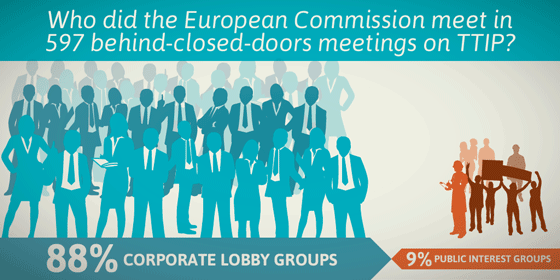
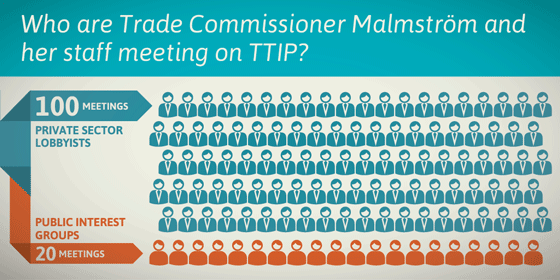
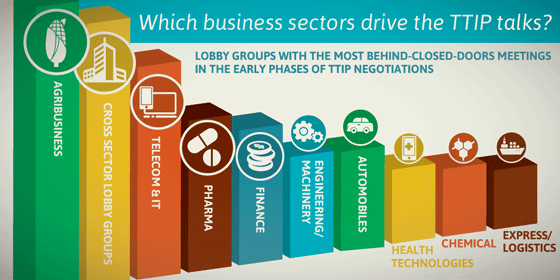
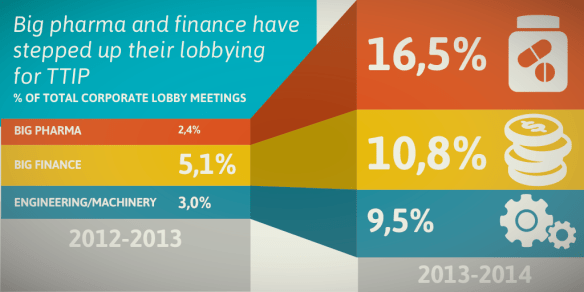

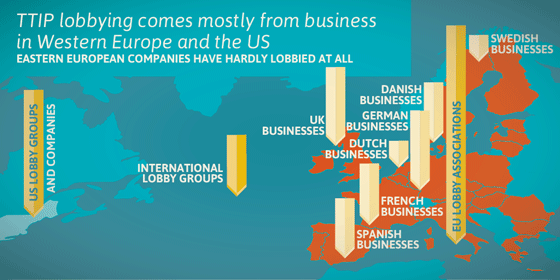
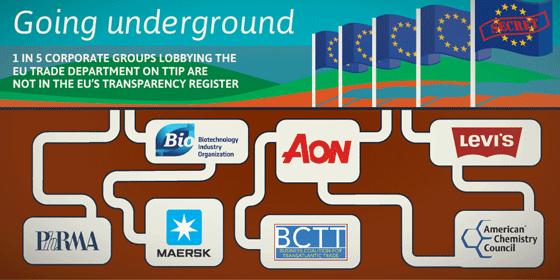
Reblogged this on sdbast.
LikeLike
Reblogged this on Citizens, not serfs.
LikeLike
Reblogged this on The Militant Negro™.
LikeLike
Reblogged this on Britain Isn't Eating.
LikeLike
Reblogged this on http://www.didyouhearpodcast.com didyouhearpodcast@gmail.com and commented:
More abut the TTIP
LikeLike
Pingback: Is Westminster now ready for the Jeremy Corbyn Effect? | Think Left
Pingback: Better Politics – Different Politics – Corbyn Politics | Think Left
Pingback: Better #Politics – Different Politics – #Corbyn Politics | johndwmacdonald